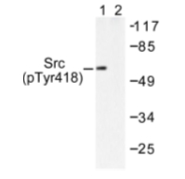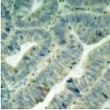SRC pTyr418 Rabbit Polyclonal Antibody
Other products for "SRC"
Specifications
| Product Data | |
| Applications | IHC, WB |
| Recommended Dilution | Western Blot: 1/500-1/1000. Immunohistochemistry on paraffin sections: 1/50-1/200. |
| Reactivities | Human, Mouse, Rat |
| Host | Rabbit |
| Clonality | Polyclonal |
| Specificity | This antibody detects endogenous levels of SRC pTyr418 protein. |
| Formulation | Phosphate buffered saline (PBS), pH~7.2 containing 0.05% Sodium Azide as preservative. State: Aff - Purified State: Liquid purified Ig fraction (> 95% pure by SDS-PAGE). |
| Concentration | 1.0 mg/ml |
| Purification | Affinity Chromatography using epitope-specific immunogen. |
| Conjugation | Unconjugated |
| Storage | Store the antibody undiluted at 2-8°C for one month or (in aliquots) at -20°C for longer. Avoid repeated freezing and thawing. |
| Stability | Shelf life: One year from despatch. |
| Predicted Protein Size | ~ 60 kDa |
| Gene Name | SRC proto-oncogene, non-receptor tyrosine kinase |
| Database Link | |
| Background | The SRC gene is similar to the v-src gene of Rous sarcoma virus. This proto-oncogene may play a role in the regulation of embryonic development and cell growth. Mutations in this gene could be involved in the malignant progression of colon cancer. The protein product is pp60vsrc, a cytoplasmic protein with tyrosine-specific protein kinase activity that associates with the cytoplasmic face of the plasma membrane. The protein consists of three domains, an N-terminal SH3 domain, a central SH2 domain and a tyrosine kinase domain. The SH2 and SH3 domains cooperate in the auto-inhibition of the kinase domain. c-Src is phosphorylated on an inhibitory tyrosine near the c-terminus of the protein. This produces a binding site for the SH2 domain which, when bound, facilitates binding of the SH3 domain to a low affinity polyproline site within the linker between the SH2 domain and the kinase domain. Binding of the SH3 domain results in misalignment of residues within the kinase domain's active site inactivating the enzyme. This allows for multiple mechanism for c-Src activation: dephosphorylation of the C-terminal tyrosine by a protein tyrosine phosphatase, binding of the SH2 domain by a competitive phospho-tyrosine residue, as seen in the case of c-Src binding to focal adhesion kinase, or competitive binding of a polyproline binding site to the SH3 domain, as seen in the case of the HIV NEF protein. |
| Synonyms | c-Src, pp60c-src |
| Reference Data | |
| Protein Families | Druggable Genome, ES Cell Differentiation/IPS, Protein Kinase, Stem cell relevant signaling - JAK/STAT signaling pathway |
| Protein Pathways | Adherens junction, Endocytosis, Epithelial cell signaling in Helicobacter pylori infection, ErbB signaling pathway, Focal adhesion, Gap junction, GnRH signaling pathway, Tight junction, VEGF signaling pathway |
Documents
| Product Manuals |
| FAQs |
| SDS |
{0} Product Review(s)
0 Product Review(s)
Submit review
Be the first one to submit a review
Product Citations
*Delivery time may vary from web posted schedule. Occasional delays may occur due to unforeseen
complexities in the preparation of your product. International customers may expect an additional 1-2 weeks
in shipping.






























































































































































































































































 Germany
Germany
 Japan
Japan
 United Kingdom
United Kingdom
 China
China




